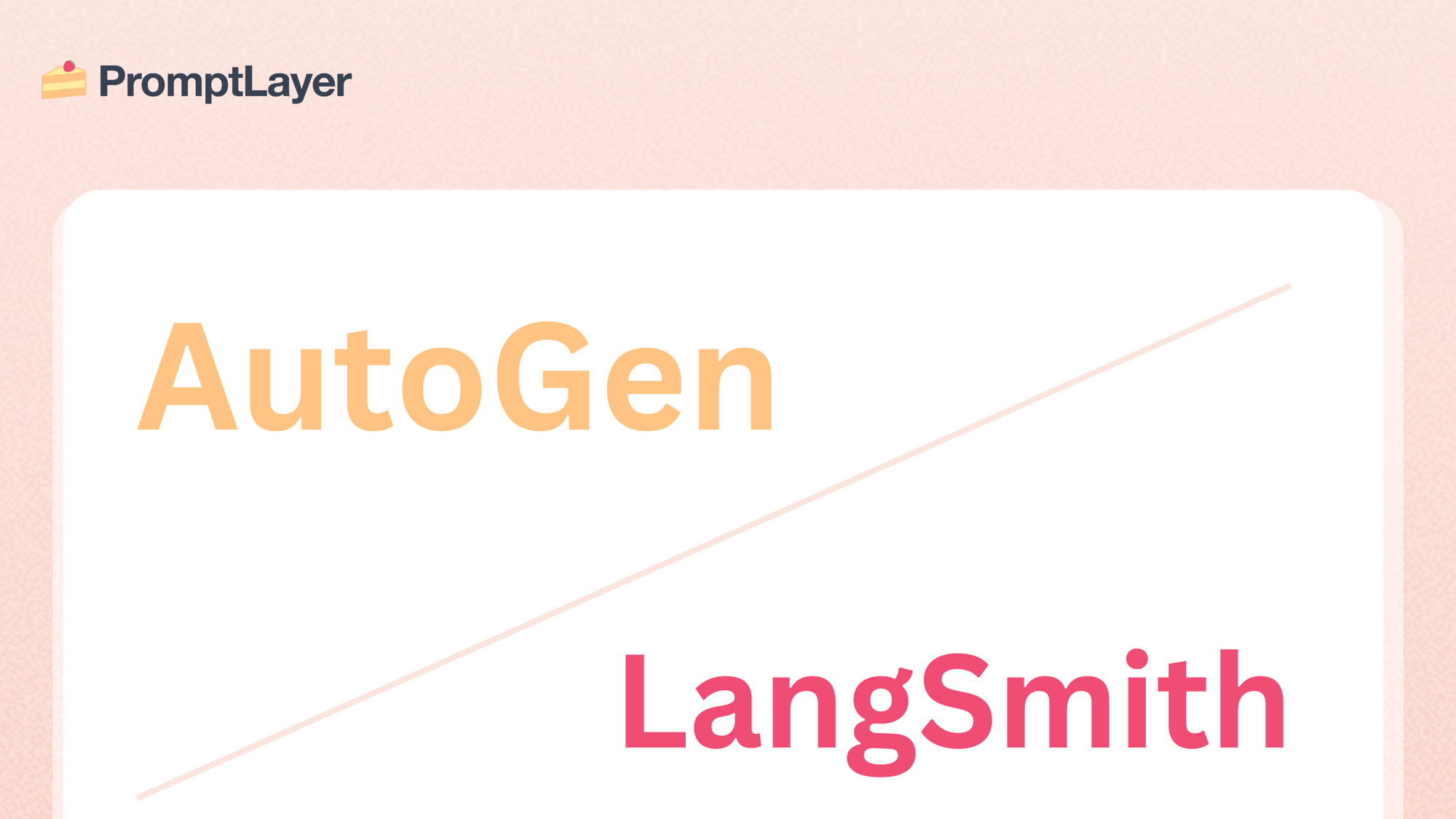LangSmith vs AutoGen: Detailed Comparison

LangSmith and AutoGen tackle different but complementary challenges in AI application development: LangSmith excels at making complex language model (LLM) workflows transparent and testable, whereas AutoGen enables the orchestration of multiple AI “agents” to collaborate on tasks.
Understanding the differences between LangSmith vs Autogen will clarify which tool aligns best with your AI project's needs. This comparison distills their core functions, interface design, pricing, integration options, and standout strengths.
What is LangSmith?
LangSmith is a service offered by the LangChain team that provides end-to-end observability, tracing, and evaluation for LLM applications. It logs every input and output in a workflow, generating detailed records (“traces”) that track precisely how data moves through prompts, APIs, and custom code (LangChain). Gathering token usage and cost data at the trace level helps teams monitor expenses and optimize prompts based on actual performance (LangSmith OpenTelemetry). The team recently added native OpenTelemetry support, enhancing compatibility with existing monitoring systems at a slight overhead cost (LangChain Blog).
Accelerate Your AI Automations with PromptLayer
PromptLayer is the ultimate prompt management system, purpose-built for teams and individuals who want to move fast and iterate with confidence.
With PromptLayer, you can organize, version, and update your prompts in a dedicated CMS, run instant batch evaluations, and deploy updates to production in minutes—not days.
PromptLayer gives you deep analytics, robust collaboration features, and seamless API access, so your prompts stay effective and production-ready. Unlock the full power of LLMs and bring true agility to your automation pipeline.
Try PromptLayer now and transform the way you build with AI!
What is Autogen?
AutoGen is an open-source framework from Microsoft Research designed to build multi-agent AI systems. Developers define collaborative “agents” that integrate language models, external tools, and human feedback to complete tasks autonomously or cooperatively (GitHub). Its Python SDK enables scripting intricate workflows, allowing agents to exchange messages, invoke APIs, and make independent decisions in response to events (AutoGen Docs). Additionally, AutoGen Studio offers a no-code web interface for assembling and testing collaborative agent workflows (AutoGen Studio Paper).
User interface and ease of use
LangSmith
- Web dashboard: Visualize trace graphs, monitor system health metrics (e.g., requests per second, error rates), and inspect prompts through a unified console (LangSmith Observability).
- Prompt playground: Iteratively craft and compare prompt versions with built-in evaluators for correctness, relevance, and bias (LangChain Tutorial).
- Beginner-friendly: A guided point-and-click interface helps non-technical users experiment with prompt engineering and basic testing.
AutoGen
- AutoGen Studio: Drag-and-drop canvas to define agent roles, message flows, and tool integrations, complete with live debugging (AutoGen Docs).
- Python SDK: Code-first option allowing developers detailed customization of agents, event handling, and external integrations (GitHub).
- Learning curve: Beginners can quickly prototype without coding, but developing complex workflows requires programming experience.
Pricing models
- LangSmith free tier: One user, 5,000 traces per month (14-day retention) at no cost (LangSmith Pricing).
- Developer ($39/user per month): Includes 10,000 free traces; extra traces billed at $0.50 per 1,000; retention up to 400 days (LangSmith Pricing).
- Plus ($39/user per month for teams): Up to 10 seats, higher rate limits, and email support (LangSmith Pricing).
- Enterprise: Custom pricing with single sign-on, SLAs, self-hosting, and dedicated support (LangSmith Pricing).
- AutoGen: MIT-licensed open source—free to use and modify. Hosting expenses depend on your chosen LLM provider (e.g., OpenAI API costs) (GitHub).
Integration capabilities
LangSmith
- Language-agnostic tracing: Compatible with Python, JavaScript, or any service via REST API (LangSmith Observability).
- CI/CD: Supports pytest or Vitest for automated testing and regression checks (LangSmith Pricing).
- APIs & SDKs: Provides programmatic control over traces, evaluations, and dashboards.
AutoGen
- Model support: Compatible with OpenAI, Azure OpenAI, and other LLM providers through plugins (GitHub).
- Tooling: Includes Docker and gRPC runtimes for distributed agent deployments (GitHub).
- Extensions: Community-built modules available for specialized tools, search indexes, and custom logic (GitHub Topics).
Unique strengths
LangSmith
- Deep observability: Precise tracking of every interaction, input/output, and associated metadata (LangChain Tutorial).
- Prompt versioning: Centralized environment for collaborative prompt iteration, review, and evaluation.
AutoGen
- Agent collaboration: Agents can debate, delegate, or consult each other, solving complex problems collaboratively (AutoGen Paper).
- Open-source flexibility: No vendor lock-in, providing full control over deployment and customization (GitHub).
Weaknesses
LangSmith
- Cost at scale: High trace volumes may lead to significant expenses without careful management.
- Self-hosting limitations: Only available under Enterprise plans, restricting smaller teams' ability to self-host (LangSmith Pricing).
AutoGen
- Limited monitoring: Built-in monitoring capabilities are minimal, requiring additional custom solutions for production use.
- Complexity: Advanced collaborative workflows involve complex event management, potentially overwhelming less experienced developers.
Conclusion
LangSmith excels at rigorous monitoring, testing, and optimization of language model workflows, ideal for teams emphasizing precise observability. AutoGen suits developers aiming to create collaborative AI agents capable of sophisticated interactions and autonomous reasoning. Choose LangSmith for robust oversight of AI performance, or AutoGen for flexibility and collaborative agent orchestration.
About PromptLayer
PromptLayer is a prompt management system that helps you iterate on prompts faster — further speeding up the development cycle! Use their prompt CMS to update a prompt, run evaluations, and deploy it to production in minutes. Check them out here. 🍰



